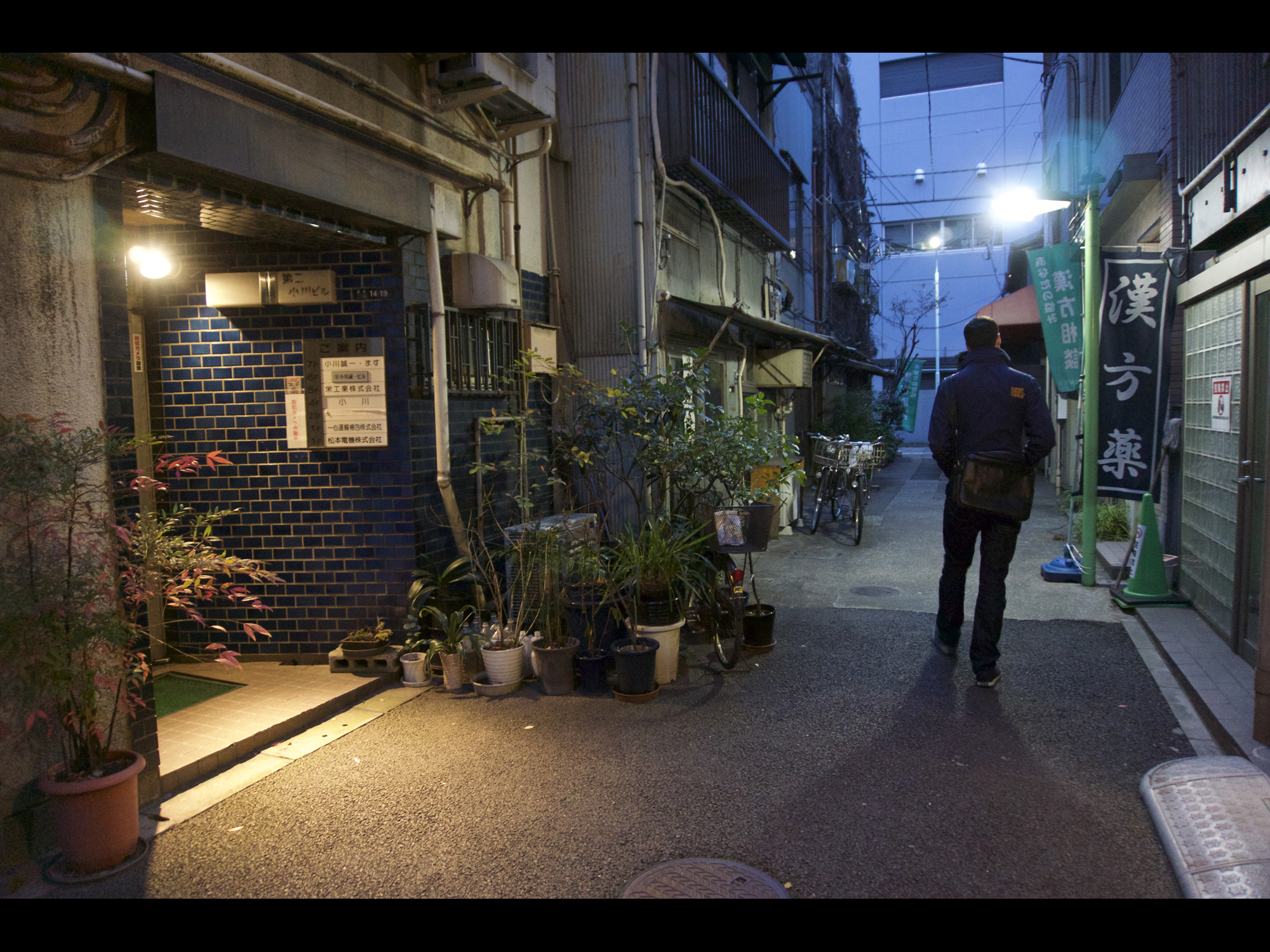OUR CART PAUSES SO THE LAST OF A FOURSOME CAN tee off. Considering that we’re in head to toe protective suits, you might think at first glance that we were on our way to a radioactive spill, which could definitely throw your golf game off. But the guests probably recognize it as beekeeping gear, because that’s what this hotel is known for. Bees.
We bounce along the hilly ground until we reach the far side of a water hazard near the 17th hole. Sean Patrick Curry, the hotel’s head chef, steps out, lumbering like an astronaut in the suit to one of almost a dozen bee hives lined up along here. Using a putty knife, he breaks off a bit of the beewax and pulls out one comb, swarming with honeybees.
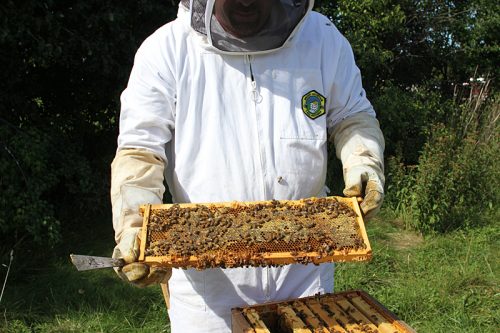
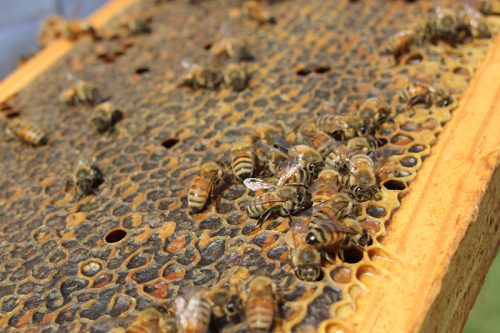
“We put them in the high grass. The pond is a good water source for them,” Curry says. “During the summer I come out here for a few hours about every two weeks, checking on them. I make sure they’re still producing honey—that they’re still there.”
“In winter they cluster around the queen to keep her warm. When the weather starts dropping we wrap the hives with tar paper and put bales of hay—almost create an igloo,” he says. “After the first frost, they’re very vulnerable to robbers, yellow jackets, so I’m out here every couple of days for the first two weeks, making sure they’re okay.”
“Does it ever freak the guests out, having bees all over the property?” I ask.
“Well, they’re honeybees,” Curry says. “They’re not yellow jackets who will go for hot dogs and beer. They don’t care about beer and soda. Unless you have pollen or fresh flowers in your hand, they don’t care about you.”
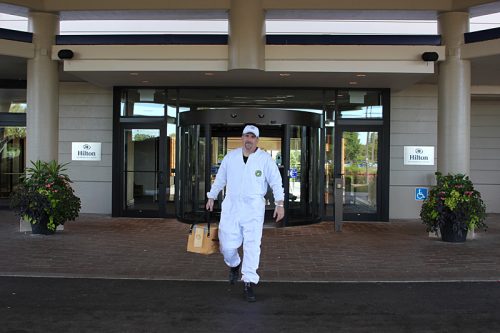
Chef Curry off to tend his bees
UNTIL VERY RECENTLY YOU AS A HOTEL GUEST, or the executive chef of a big resort for that matter, wouldn’t have cared much about bees, either. Or local food, or sustainability. No one has fewer ties to place than someone who’s just checked in for a few nights.
Or so I assume when I arrive at the Hilton Oak Brook Hills Resort and Conference Center, a complex overlooking a beautifully sculpted golf course in Oak Brook, known as home to McDonald’s (though not for long), ACE Hardware and other major Chicago-area companies. The 150-acre complex plays host to meetings, conferences and continuing education seminars year-round. (It’s also just down the street, ironically enough, from another recent Fooditor subject, of a very different sort.)
My first guess is that any commitment to sustainability and local food is mainly an interest of the chef’s, indulged by his employers. And Curry, a big, soft-spoken man, says that’s what he expected, too. He’s been keeping bees for eight years, and this is his third hotel with hives on the property; he did it first at a Marriott in Baltimore, and then at one in Naperville.
They had heard about me being a beekeeper, and they said, we’ll hire you only if you do the bees.
“The other places, it was like, okay, we’ll get some marketing out of it, we need to do it to humor the chef,” he admits. “But here, it was different. They said, you need to be part of your community. It’s part of the ethics. They want to make money but have a purpose in the community.”
Hotels may have a national brand (like Hilton) but they’re actually run by management companies, so “they” is Portfolio Hotels & Resorts, based in Oak Brook. They brought Curry in two years ago, as part of a planned complete renovation of the property which ran in stages from January through August of this year. “They wanted to take the food and beverage concept as a whole into local and sustainable,” Curry says. “They had heard about me being a beekeeper, and they said, we’ll hire you only if you do the bees.”
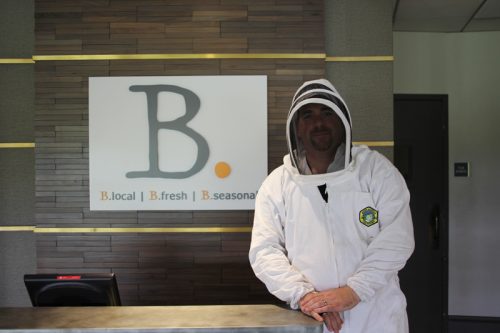
The result extends well beyond the ten hives by the pond, or even the herb gardens you can see from the lounge, where they grow basil, dill and other things for the kitchen—and where bees buzz around, undisturbed by guests passing in and out. The hotel’s main restaurant, which had previously had the generic name “Windows” (yes, there are windows looking out on the golf course) and a menu which could have been in any hotel anywhere, was renamed “B.” with the slogan “B. local/B. fresh/B. seasonal.” Its menu was completely reworked to make as much use of produce from both the hotel’s grounds and from midwestern farmers as possible.
A hotel like this is a big account, and Curry knows the impact he can have when he chooses a local farmer as a vendor. “We started discussing this the day I interviewed, and I was pretty passionate about it. I wanted to buy from local vendors, I didn’t want an Italian restaurant or a steakhouse. I wanted to have some freedom where I could really get buy-in from the local farmers.”
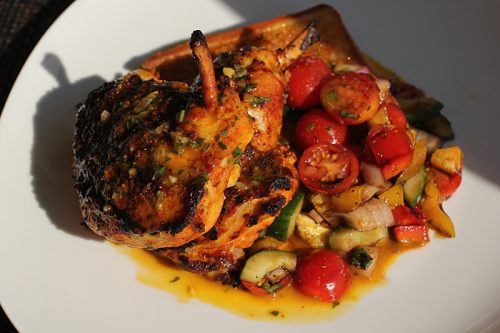
Roast Cameron Farms chicken with panzanella salad of local tomatoes and vegetables, garlic butter
So he buys meat from Chicago 250, which sells naturally raised beef raised within 250 miles of Chicago. He buys pasture-raised chicken from Cameron Farms in Missouri. He gets Wisconsin butterkase for his burger (you gotta have one on the menu) through Great American Cheese Co., and turns local summer tomatoes into tomato jam so he doesn’t have to deal with dead of winter tomatoes. Herbs come from Chef’s Garden in Ohio, and greens from Gotham Greens in Pullman.
His coffee is from Columbia Street Roastery in Champaign, bought fair trade in one Ugandan village and ground and packaged by developmentally disabled workers at Misericordia in Chicago—and besides the fact that it’s good coffee (“We all know hotel coffee, it’s terrible, but I have guests asking if they can buy pounds of our coffee”), Curry is plainly excited about being the customer with the big checkbook in that equation.
“My dream is that you’re taking these farmers and making them a ton of money,” he says. “That’s what I want to be recognized for—delicious food, but making delicious food is just the minimal expectation. Everybody has to produce delicious food. But when you hear John at Columbia Street talk about that village in Uganda and how you’re changing lives there, it’s really cool.”
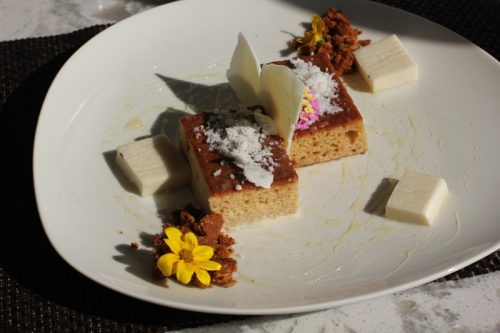
Pastry chef Erika Tomei’s tribute to the honey harvested on property: tres leches honey cake, B. honey, dehydrated milk foam, honey-oatmeal crumble, white chocolate “honey comb,” edible flowers
As we’re talking, Steven Ellingsen, the hotel’s general manager, stops by the alcove we’re in. Ellingsen, who gives off the air of a man who will make sure the A/V in your meeting room is working now, starts to explain why the hotel went all in on a local, sustainable focus. “We did a lot of research for the market. Our competitive set is a lot of branded restaurant and chains, there wasn’t a focus on sustainability in the Oak Brook area.”
I cut him short and ask, “Why does that matter?” He’s a little taken aback at first. “Why does it matter? Because it does,” he says. “It supports locally driven and small scale businesses around our community.”
“And there’s more of a story to tell,” he continues. “The fact that someone can sit in the window and know that part of their salad came from the chef’s garden is a great story, and then the next step is, how do we infuse that into the mixology program? And the charcuterie program? There’s a lot of great stories to tell. If we can, why wouldn’t we?”
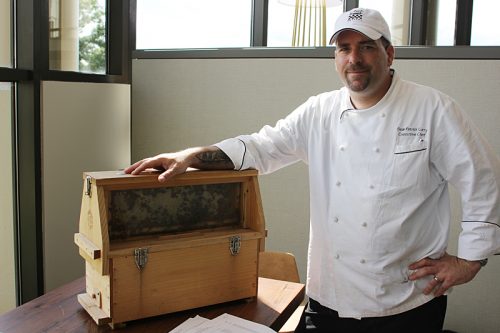
Chef Sean Curry with his box of bees
IN OTHER WORDS, IT MATTERS TO A HOTEL BECAUSE IT matters to guests of the hotel. At least, it does once you introduce the possibility of it mattering to them, by doing it. (Which came first, the bees or the hotel?)
I wasn’t convinced that would be true at first. But the first thing that got me believing was a prop that Curry had set up when I arrived—which was, quite literally, a box full of bees. A portable hive—tightly sealed, thankfully; plus the device for extracting the honey from the combs. “We just had a medical publishing conference here,” Curry says. “And they wanted me to set this up as a display, to help draw people into the exhibits. I’ve done half a dozen tours, taking groups out to see the bees. There was a local golf course that said, oh, we want to have bees, can you show us how?”
If you travel a lot, hotels quickly blur together. Doing something locally-focused on your property is a way to have an identity that engages guests. So when I ask Curry if guests really care about what he’s doing, he says, “I’ll be honest with you, I’m shocked how much they do care. I love how much in this area, people support the idea, love the food but support the cause, and think how great it is, and ask me a million questions about the bees, and what can we do [about bee colony collapse]. They care about where we buy the food. And it’s great that the service staff buy into it—they’re selling the dream, and then they’re like ‘Do you want to meet the chef?’ It’s great—and it’s actually keeping me very busy, which is a great problem to have.”

Chef’s Garden
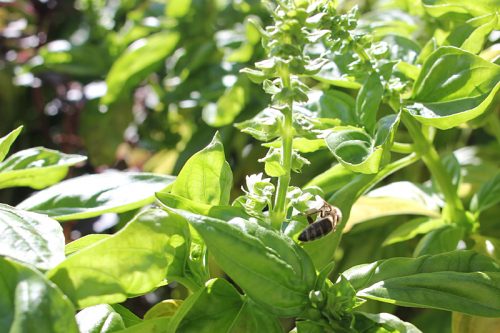
Bee is for basil
“The banquet world is growing a demand for farm to table,” he says. “Think about it—900 people here, having breakfast for a week and they want farm to table. People want transparency in what they’re eating—where’d you get this from, what’s the purpose, can you trust it?”
If they’re right about this being something hotel guests will come to expect, they’re well positioned to expand on what’s happening here. Curry talks about plans to start a farmers market on the property (though that’s probably a year or two away), and he says he just had a meeting with the hotel’s ownership about expanding this “food and beverage concept” to all their properties.
But still, I want to know what started all this—what got Curry interested enough in bees to want to keep them, as well as running a massive kitchen and feeding a hotel morning, noon and night. “My daughter is 11, when she was born—you know, we work a lot of hours,” he explains. “And I had this kind of guilt, like why am I working so much, but there’s no way around the hours. So I started thinking, what can I do or what do I tell them or how can I make it worth their while? That’s when colony collapse happened and was all over the media.”
At the time he was working for Marriott in Chicago. “Friends of mine own Heritage Prairie Farm up in Elgin, and they have beehives up there and they actually sell their honey at Whole Foods. I just started taking a class, and I thought maybe I can’t change the world, but there are things I can do. I met friends of theirs that are local farmers, and I just started getting into the farmer community and wanting to keep things local and sustainable.”
“And bees are the overwhelming shadow of it all. Bees pollinate a third of the world’s food sources. And without them we’re in big trouble. How can I not do it? My kids need a world to live in.”
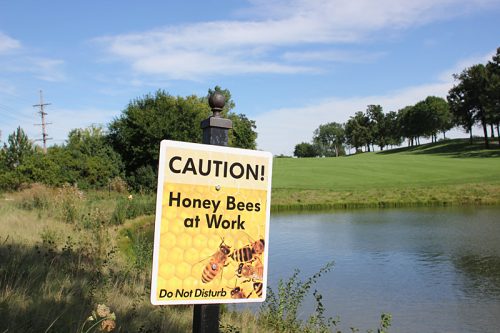
Michael Gebert is busy as a bee as editor of Fooditor.
Latest
Join the Discussion
After you comment, click Post. If you're not already logged in you will be asked to log in or register with Disqus.






